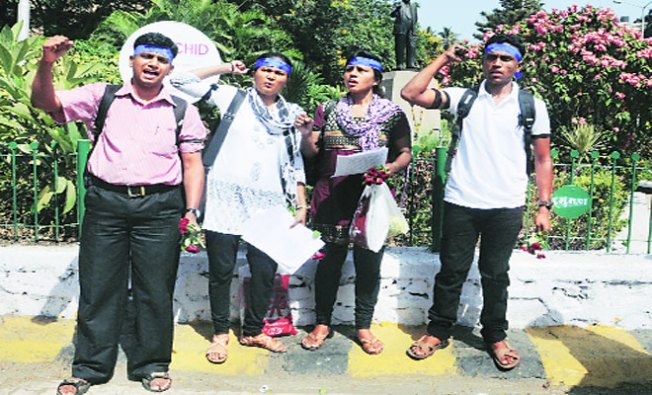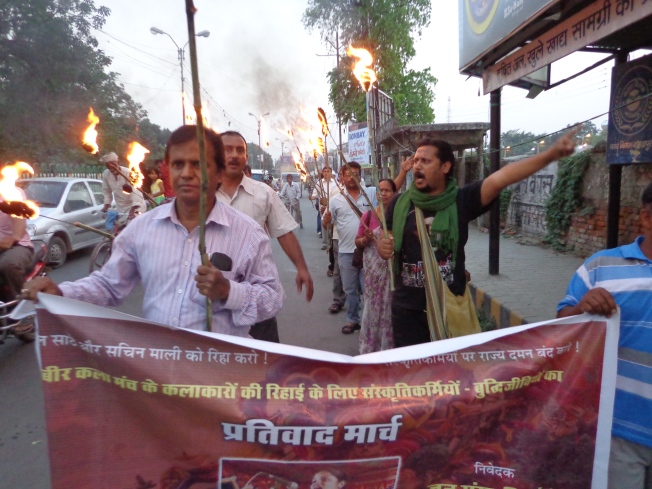Through their controversial protest music, Kabir Kala Manch aims, not to create commotion but, to bring about change. Neerja Dasani

The art of irony is something that the members of Kabir Kala Manch (KKM), who identify themselves not as a cultural troupe but as a political movement, are well-versed in. This could be because life for them has been a series of curious contradictions. Emerging from mohallas and bastis , their voices reverberated through the corridors of power, disturbing the slumber of those within. Finding democracy’s din too unsettling, its elected guardians branded KKM as anti-national. The resultant time spent either in jail or underground, strengthened the members’ resolve instead of silencing them into submission.
Along the way, they have lost jobs, fallen behind in their academic pursuits, been separated from their families; they were prominently featured in Anand Patwardhan’s incisive documentary ‘Jai Bhim Comrade’ which has gone on to win aNational Award. At a recent performance at the Film and Television Institute of India, Pune, KKM along with the event’s organisers, were attacked by members ofAkhil Bhartiya Vidyarthi Parishad. The attempt to intimidate supporters led instead to a surge in KKM’s popularity, with invitations to perform coming in from across the country.
A fraction of the group was in Chennai last week to participate in Prakriti Foundation’s annual ‘Poetry with Prakriti’ festival. Rupali Jadhav, Deepak Dhengle, Ramdas Unhale, Dada Waghmare and Laxman Kalleda expressed their intent to continue “taking the voice of the people to the people and giving them the courage to stand up against injustice”. Even without their “real strength” – Ramesh Gaichore, Sachin Mali and Sagar Gorkhe, who are still in jail, and Sheetal Sathe and Jyoti Chorge who are currently unable to tour – they astutely lay bare ground realities, using wit and satire to raise issues such as caste discrimination, women’s oppression, the agrarian crisis, rising inequality and rampant superstition.
Following in the tradition of Dalit protest music, they draw artistic inspiration from people like Annabhau Sathe, Vilas Ghogre and Sambhaji Bhagat, while ideologically they turn to Ambedkar, Bhagat Singh, Jyotiba Phule, Savitribai Phule, Periyar etc. — names that an urban elite audience hardly ever encounters, except perhaps on street signs. “The capitalist media’s brainwashing causes even a grassroots person living in a shanty to be preoccupied with the same thoughts as a mansion-dweller. We’re forgetting the world around us,” says Deepak Dhengle. With lyrics like ‘The sky is your roof/no blanket in the winter/your world is at the traffic signal/standing in the glaring sun/Why is it like this?’, KKM attempts to rouse people from their stupor.
While their focus has been on building solidarity among the dispossessed by performing in slums, villages and factories , they are now reaching out to the middle class which they perceive as being vital to any social upheaval. While earlier their lyrics were only in Marathi, they now have a sizeable Hindi repertoire, widening their reach.
With an eye on the general elections they urge people to vote against feudal and communal forces. Taking digs at the two major electoral parties, they mock the religious agenda of one (‘All they can see is temples here/there/up and down’) and the everlasting “Garibi Hatao” slogan of the other. “If you are tired of this kind of politics, choose the form which suits you best and take power into your own hands,” says Dhengle.
KKM’s poetry also has a strong feminist current. The women shahirs (poet-singers) live their politics, working hard to complete their education and choosing their own life partners, often from outside their caste. Having faced the double discrimination of growing up as a woman in a Dalit household, Rupali Jadhav displays this political maturity while interrogating the audience: “After the Delhi gang rape, people were asking for the perpetrators to be hung, but will that change anything? If we must hang something it should be the feudal system that has taken root in the mind of every Indian male.”
Discussing their creative process Jadhav notes wryly, “There’s no need for us to do riyaaz (practice) to think about oppression. We write what we experience.” It is this directness that has touched a raw nerve in the authorities as well as the audience. One reacts with suppression, the other with solidarity. “Our idea is not to create a commotion, it is to create change,” says Dhengle.



 Mumbai Social ‘Raptivist A-List is back on your speakers with a new joint called ‘Free
Mumbai Social ‘Raptivist A-List is back on your speakers with a new joint called ‘Free 



 Angry verse A poster by
Angry verse A poster by